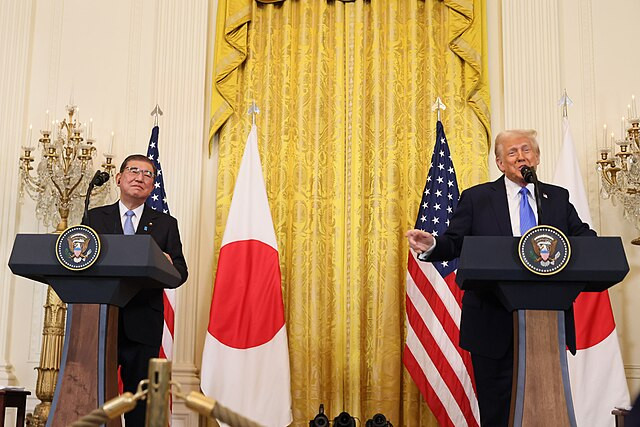The U.S. has agreed to revise a presidential executive order to eliminate overlapping tariffs on Japanese goods, Japan's top trade negotiator said Thursday, ending weeks of uncertainty over the interpretation of a high-profile trade deal between the two countries.
Ryosei Akazawa, who met in Washington with Commerce Secretary Howard Lutnick and Treasury Secretary Scott Bessent, said the correction will ensure a 15% reciprocal tariff on Japanese imports will not stack on top of existing levies, as had been feared for products such as beef and fabrics. "Frankly, I did not expect to be visiting the U.S. again so soon after my last trip," said Akazawa, noting it was his ninth visit since April.
The July 31 executive order included a no-stacking clause for the European Union but omitted Japan, which Akazawa called an "extremely regrettable" oversight. He said U.S. officials promised to amend the order and refund any excess duties collected. For goods like fabrics, previously subject to a 7.5% rate, the levy will now be capped at 15% instead of combining to 22.5%. For beef, already taxed at 26.4%, the rate will remain unchanged rather than rising above 40%.
Lutnick and Bessent also said the White House will issue a separate order lowering tariffs on Japanese autos and auto parts to 15% from 27.5%, in line with the bilateral agreement reached last month. That deal, announced by President Donald Trump on Truth Social, set most tariffs at 15% and included a pledge by Japan to invest $550 billion in the U.S.
Trump likened the investment to "a signing bonus that a baseball player would get," saying, "That's our money. It's our money to invest, as we like." Japanese officials have clarified that only 1% to 2% of the total would be direct investment, with most coming as government-backed loans and guarantees. Akazawa dismissed Trump's phrasing as "just typical Trump talk."
The absence of a signed joint statement after the July negotiations fueled confusion in Tokyo and criticism of Prime Minister Shigeru Ishiba, who defended the move as necessary to speed implementation. Ishiba has faced internal pressure to step down after his party's loss in last month's upper house election.
Markets responded positively to the tariff clarification. Japan's Nikkei 225 rose 1.85% on Friday to 41,820.48, while Toyota, Honda and Subaru shares gained 3.47%, 3.95% and 5.37%, respectively. Shoji Hirakawa, chief global strategist at Tokai Tokyo Intelligence Lab, said the reports "calmed fears over U.S. tariffs and helped drive the market higher."
Japan is one of eight major U.S. trading partners to reach a framework deal with Washington. By contrast, recent U.S. tariff hikes have set rates at 50% for Brazil, 39% for Switzerland and 35% for Canada. The Japanese government said it will "continue to maintain close communication with the U.S. side at various levels" to ensure the agreement is implemented as negotiated.





